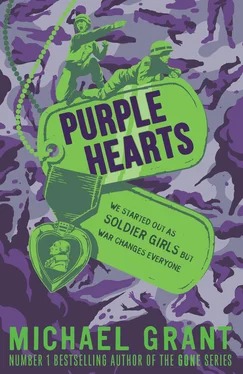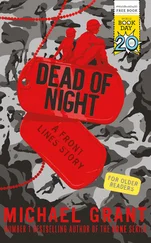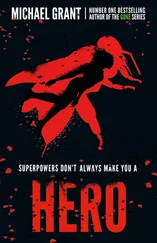Since Frangie is small, young and reasonably agile she’s been assigned a top bunk—just three high in this particular space. She unlaces and kicks off her boots, lies back on her wool blanket and runs a mental inventory through her supplies. Bandages, plasma, tourniquets, splints, salves, sulfa powder, tape, scalpel, scissors, needle and thread and yes, morphine.
She has never dealt with a serious burn injury. And now that Moore is no longer there to annoy her, his worries and questions persist.
What will it be like?
How will I do?
And just what exactly am I supposed to do to help a man inside a burning tank?
She draws out and unfolds her most recent letter from home. It’s all the usual chit-chat, all but one paragraph:
Your father has been feeling poorly of late and has had to skip some work this week. But he’s going to see Dr. Teller if he doesn’t feel better.
It doesn’t sound like much, but her dad generally has to be missing a limb to even consider going to the doctor. Frangie rolls onto her side, closes her eyes and prays fervently.
Please, Lord, if it is Your will, care for my father.
She then asks divine protection for Harder, for her little brother, Obal, and above all, and most fervently, for her mother.
She has too much to carry, Lord. Harder exiled from the family, me here, and . . . and the other things You know of, Lord.
The prayer brings terrible, sickening images to her mind. She was not born when it happened, and she grew up never knowing, but she knows now, and her imagination will not cease supplying lurid mental images of the great Tulsa riot, of colored men and women fleeing as white folk fired down at them from biplanes and threw gasoline bombs on black businesses.
But now, added to those images, come imagined scenes of Sergeant Moore burning alive.
Please, Lord, if it is Your will, care for Sergeant Moore.
For the last almost two days she’s been dealing with seasickness, venereal disease and various psychosomatic illnesses, each accompanied by some version of, “I gotta go home, Doc! I can’t be fighting Germans with this back pain!” This is not strictly her job, but the day-in, day-out of dealing with soldiers has kept her distracted from what is coming.
Coming eventually.
Coming soon.
The suspense is killing everyone. It’s almost as bad for morale as the seasickness. Everyone wants to go, and everyone is afraid—anxious to get on with something that frightens them. In a hurry to discover whether they will live or die.
Though of course Frangie knows the majority of them simply do not believe in their own mortality. The men and the women, the average GIs, the ones who will soon be driving Shermans and being hunted by Tigers, just want to get it all over with.
And then, go home. Because if the American army has a single, unifying thought that runs through every division, every battalion, every platoon, white or black, it is: Let’s get this over with and go home.
Frangie is not in a hurry, though she shares the general annoyance at the delays. She has been on the front line in Italy. She’d been badly wounded, though she has only hazy memories of being hurt. She had a long spell in recovery from her wounds, a pleasant spell once her pain was mostly gone, during which time she had worked in an unofficial capacity in the same hospital that treated her. There she spent some time with her brother, Harder Marr, now working as an army orderly.
She had also spent an unreal interlude with Rio Richlin and Rainy Schulterman, two women she knew as acquaintances, when the three of them were awarded the Silver Star. The three then had leave for a week and, joined by Richlin’s friend Jenou Castain, they had enjoyed themselves in London, going to shows and dining in restaurants like nothing Frangie had experienced.
The strangest experience for Frangie was simply being able to go into restaurants and pubs with three white girls, sit at the same table, and be served by white or brown waiters indifferent to her race. That was not the sort of thing that went on in Tulsa.
But that pleasant coffee break is now over. The war is coming back. Soon this LST will sail to meet it. Soon, very soon, the guns will erupt, the shells will fly, and men and women on both sides will be blown apart.
And some will burn.
Not that, Lord. Gentle Jesus, not that.
She should sleep. But sleep won’t come.
A loudspeaker squawks, but she can’t make out the words through steel bulkheads.
And then she hears the sound of running feet—sailors called to their stations. And the LST’s engines come to life, sending vibrations reverberating through the deck.
Frangie checks her watch. Midnight has come and gone.
It is the morning of June 6, 1944.
5
RAINY SCHULTERMAN—NEAR ANGOULÊME, NAZI-OCCUPIED FRANCE
The boat ride up the Charente had been pleasant and mostly problem-free. Rainy and her two French companions had been stopped and their boat boarded by the milice , the French police supposedly under the control of the treasonous Vichy regime, but effectively now under direct Nazi control. But this had been handled with some of the currency Rainy had brought with her.
At the dock in Cognac there had been another offer of currency and another cursory look around the boat before its cargo—mostly oysters, but some black market cigarettes as well—could be off-loaded.
The truck had been where the truck was supposed to be, already loaded with three big barrels of Cognac, the local brandy named for the town. It was just under a hundred miles from Cognac to Limoges, and the first part of that had been easy as well.
Rainy found herself almost relaxing, or relaxing to the extent she could, while crammed onto the narrow bench between Étienne and Marie. The seat had a loose spring that seemed determined to dig a hole into Rainy’s tailbone.
The countryside outside the truck’s dirty windows is beautiful, though bleakly empty to Rainy’s New York City sensibilities. From time to time Rainy asks Marie what is growing in a particular field.
“Grapevines, of course.”
“Ah. Right. I’ve seen grapevines before.” She has, but not being very interested in agriculture Rainy has not quite made the connection between the stunted, misshapen vines and grapes. Or wine. “And what’s this now?”
“That? Why that is maïs —corn—to feed the geese and the ducks and the pigs.”
“Huh.”
It is a boring drive. The only interesting bits come when the road winds through a village, but after a while all the villages look the same. Stone houses, tile roofs, small windows, narrow doors opening directly onto barely-there sidewalks; a baker, a butcher, a grocery store, a café, a shoe store, a dress store, all with small display windows, many with no sign to indicate their function because this area does not get many tourists, certainly not since war came.
“Okay, what’s going on there?” Rainy sits forward, suddenly alert. The field beside the road has armed civilians slouching before it.
“Ah, that is tobacco. It must be guarded.”
“We have a choice,” Étienne says. “We are coming to La Rochefoucauld. There we have a split. We can go left which avoids the town and goes most directly to Limoges. Or we can go through the town and then pass through the forest, where we may come upon elements of our friends, the Das Reich. The Boche hide their tanks under the trees, fearing the RAF.”
“That sounds good,” Rainy says. But she senses something in the way Marie glances at her brother and makes a face.
Sure enough, as they enter the town, Étienne suddenly announces a need to stop off and check on a friend.
Читать дальше












